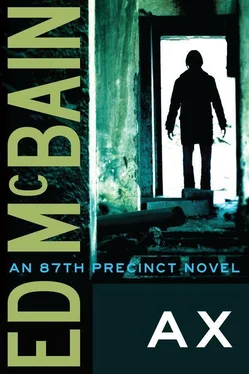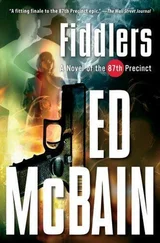“I’ll put on a light,” Lasser said, and he moved to a standing floor lamp behind a huge and ornate couch, snapped on the light, and then stood awkwardly beside the couch and his mother. Mrs. Lasser stood with her hands entwined at her waist, a simpering smile on her lips, as though she were a Southern belle waiting to be asked for a dance at the yearly cotillion.
“Sit down, please,” Lasser said, and Carella searched for a chair and then sat on the couch. Hawes sat in a straight-backed chair which he pulled over from a drop-leaf desk against one wall. Mrs. Lasser stood against that wall, smiling, still waiting to be asked for a dance. Lasser himself sat next to Carella on the couch.
“Can you tell us what happened?” Lasser said.
“Someone killed him with an ax,” Carella said.
“An ax?”
“Yes.”
“Where?”
“In the basement of the building where he works.”
“Why?” Lasser asked.
“Y is a crooked letter,” Mrs. Lasser said, “and A is for ax.”
“Mother, please,” Lasser said. He did not turn to face his mother as he said the words. His eyes did not even flick in her direction. It was as though he had said these same words a thousand times before—”Mother, please”—and said them only unconsciously now, with no need to look at her or to face her, without even the need to know for certain that she had heard him. Still watching Carella, he said, “Do you have any idea who might have done this?”
“None at all,” Carella said. “Yet.”
“I see.”
“If you will, Mr. Lasser, we’d like you to come down to the morgue with us and make a positive identification. Then we’d like to know from you whether or not your father had any—”
“I couldn’t leave my mother alone,” Lasser said.
“We could arrange for a patrolman to stay with her.”
“No, I’m afraid that would be unsatisfactory.”
“I don’t understand, sir.”
“Either my father or I must stay with her at all times,” Lasser said. “And since my father is dead, the burden is now mine.”
“I still don’t understand,” Carella said. “Even when your father was alive, he went to work in the city.”
“That’s right,” Lasser said.
“Don’t you work, Mr. Lasser?”
“I work here,” Lasser said. “At home.”
“Doing what?”
“I illustrate children’s books.”
“I see. Then you were able to stay here at home whenever your father was gone, is that right?”
“Yes, that’s right.”
“And whenever he was here, you were free to go, is that also correct?”
“Well, essentially, yes.”
“What I mean is, well, if you had a book to deliver, or an editorial conference, anything like that. Or a social engagement.”
“Essentially, that’s it, yes.”
“Would you amend it in some way, Mr. Lasser?”
“No.”
“Or correct it?”
“No. Essentially, that’s it.”
“The word ‘essentially’ implies that I haven’t understood the complete picture,” Carella said. “Could you fill me in on it, Mr. Lasser?”
“Well…”
“Yes?”
“Well, I rarely leave the house,” Lasser said.
“What do you mean?”
“To deliver books. I do that by mail. Or for editorial conferences. I do that by phone. Anyway, I illustrate, as I told you, and there’s not very much to discuss once the initial sketches have been submitted and approved.”
“But you do leave the house on social engagements?”
“Well, not very often.”
Carella was silent for a moment. Then he said, “Mr. Lasser, do you ever leave the house?”
“No,” Lasser answered.
“Are you agoraphobic, Mr. Lasser?”
“Am I what?”
“Agoraphobic.”
“I don’t know what that is.”
“Agoraphobia is an abnormal fear of open spaces.”
“I’m not afraid of going outdoors, if that’s what you mean,” Lasser said. “Abnormally or otherwise.”
“When was the last time you went out, can you tell me that?”
“I don’t remember.”
“You spend all of your time here in this house, is that right? With your mother.”
“And with my father, when he was alive.”
“You have your friends come here to see you, is that it?”
“Well, essentially, yes, that’s it.”
“Again we have the ‘essentially,’ Mr. Lasser.”
“Yes, well, the truth is my friends don’t come here very often,” Lasser said.
“How often do they come, Mr. Lasser?” Hawes asked,
“Not very often.”
“How often?”
“Never,” Lasser said. He paused. “As a matter of fact, I don’t have many friends.” He paused again. “My books are my friends.”
“I see,” Carella said. He paused. “Mr. Lasser, would you be willing to identify the corpse from a photograph?”
“I would have no objections.”
“We usually prefer a positive identification from the body…”
“Yes, but that’s impossible, as you can see,” Lasser said. “I must stay here with my mother.”
“Yes. With your permission then, we’ll come back with the police photographs and perhaps you’d be so kind as to…”
“Yes.”
“And at that time,” Carella said, “we’d also like to ask you some questions about your father and his personal relationships with other people.”
“Yes, of course.”
“But we won’t burden you with that now,” Carella said, and he smiled.
“Thank you. I appreciate your consideration.”
“Not at all,” Carella said. He turned to the old woman. “Good afternoon, Mrs. Lasser.”
“God b’ wi’ you, and keep you, and heal your pate,” Mrs. Lasser said.
“Ma’am?” Carella said.
“My mother used to be an actress. Those lines are from Lear.”
“Henry the Fifth,” the old lady corrected. “Fluellen to Ancient Pistol.”
“ ‘Doth fortune play the huswife with me now?’ “ Hawes said suddenly. “ ‘News have I that my Nell is dead i’ th’ spital, Of malady of France; And there my rendezvous is quite cut off.’ ”
“How do you know that?” the old lady asked, turning to Hawes and grinning with delight.
“We did it in high school,” Hawes said.
“Who’d you play?”
“Nobody. I stage-managed.”
“A big man like you,” the old lady said. “You should have been on the stage showing your cock.”
For a moment there was a deep silence in the room. The detectives glanced at each other as though not certain they had heard the old lady’s words. And then Anthony Lasser, without turning to look at her, said, “Mother, please,” and showed the detectives to the door. Behind them, they could hear Mrs. Lasser laughing raucously. The door closed. They stood on the slate walk for a moment. It was late afternoon, and there was a new chill in the air. They lifted the collars of their coats and listened to the sounds of the boy across the street as he pedaled his tricycle on the pavement and fired an imaginary pistol, “P-kuh, p-kuh, p-kuh!”
“Let’s go talk to him,” Carella said.
“Why?”
“I don’t know.” He shrugged. “The old lady was staring at him.”
“The old lady is nuts,” Hawes said.
“Mmm, that’s for sure. What did you think of the son?”
“I don’t know. He could be providing himself with an alibi a mile long.”
“Which is why I was jumping on him.”
“I know.”
“Or, on the other hand, he could be telling the truth.”
“I wish we knew a little more about the old man,” Hawes said.
“All in due time. When we come back with the pictures, we’ll ask our questions.”
“While the corpse grows cold.”
Читать дальше












